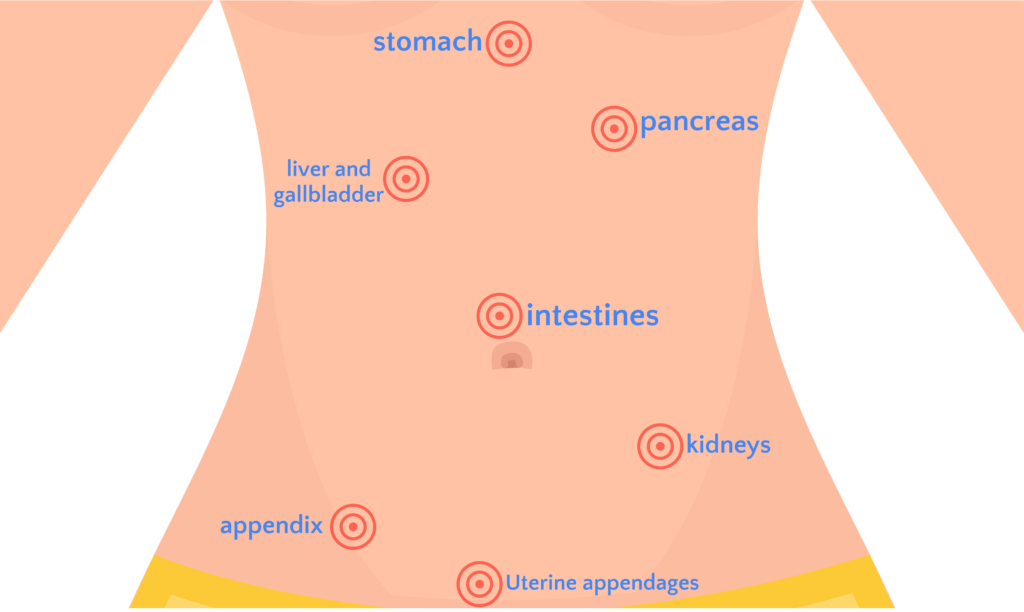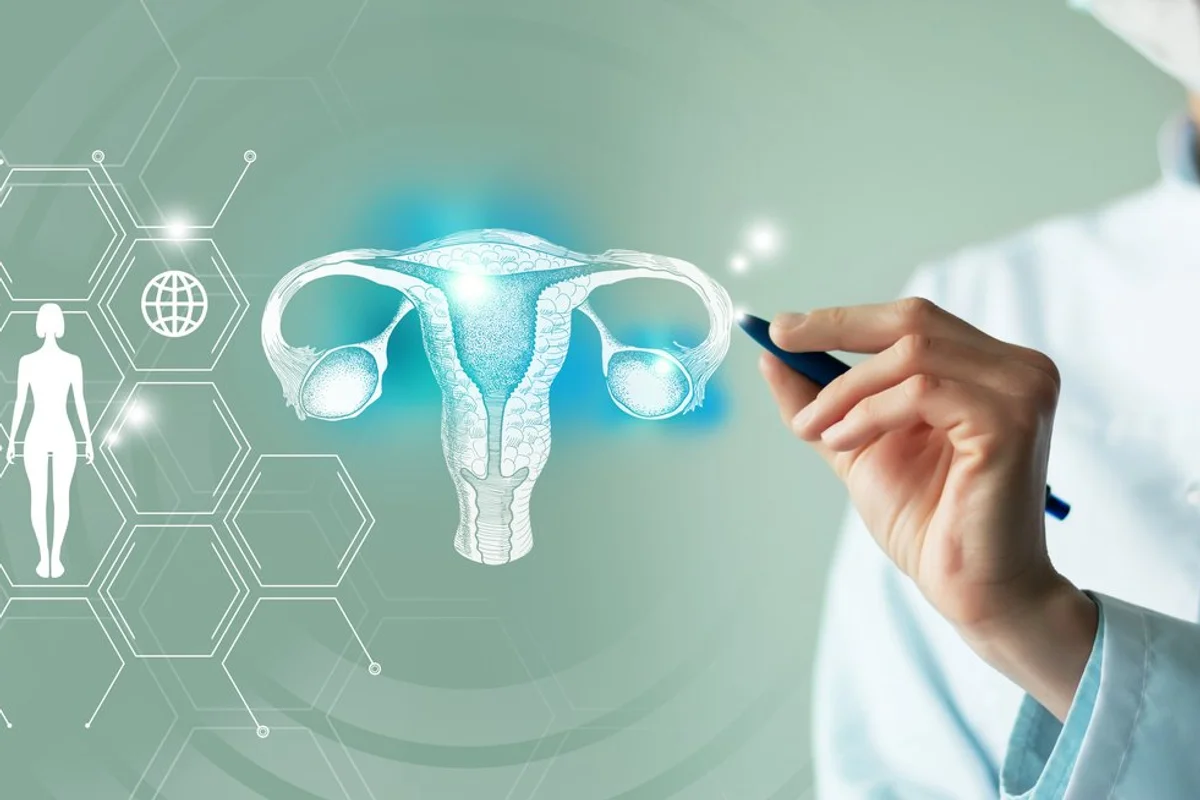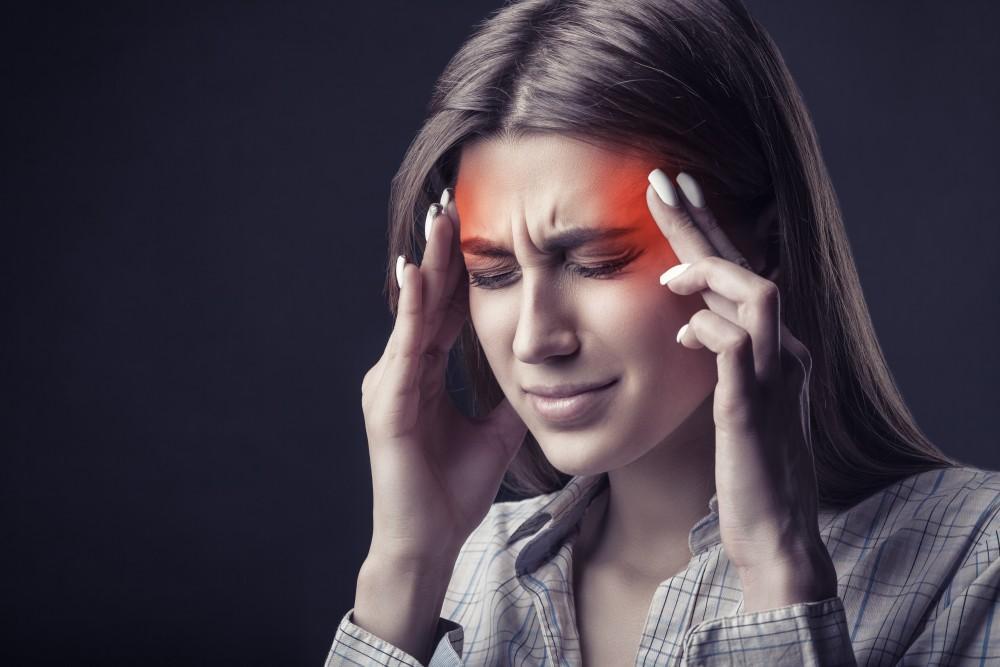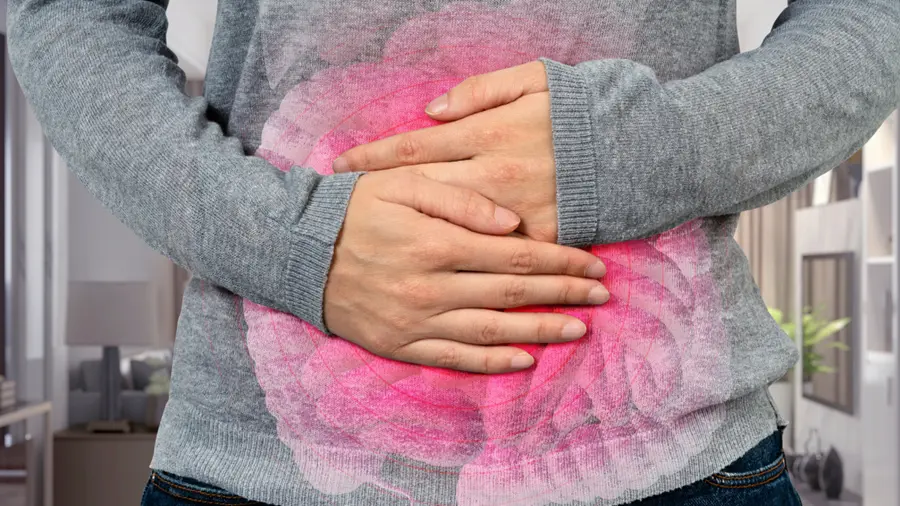Abdominal discomfort or pain is a common experience for many individuals at various stages of life. Typically felt in the area of the body below the ribs and above the pelvis and groin, this sensation, often referred to as stomachache or bellyache, can vary from mild discomfort to severe, incapacitating pain.
Though abdominal pain is not a usual occurrence, it doesn’t always signal a serious issue and can often alleviate on its own.
However, specific types of abdominal pain may serve as indicators of a more severe health condition. Therefore, it’s crucial to be aware of certain signs that may suggest an underlying problem necessitating medical attention.
Different Symptoms
Abdominal pain can present in various forms, and aside from its severity, it can be categorized as follows:
- Generalized Pain: This type of pain is felt across more than half of the abdominal area and is commonly associated with conditions like stomach viruses, indigestion, or gas.
- Localized Pain: Here, the pain is confined to a specific area of the abdomen, often indicating issues with organs such as the stomach, appendix, or gallbladder.
- Cramping: Characterized by intermittent pain that fluctuates in intensity or location within the abdomen, cramping is typically benign and can be caused by factors like gas, bowel movements, or menstruation.
- Colicky Pain: Similar to cramping, this type of pain comes and goes but is typically intense and sudden in onset and cessation. It is often associated with conditions like kidney stones or gallstones.
It’s crucial to contact your doctor if the abdominal pain is so severe that movement exacerbates it or if you cannot find a comfortable position to alleviate it.
If you experience any of the following symptoms along with abdominal pain, seek medical attention immediately:
- The fever
- Stools with blood
- Vomiting and nausea that persists
- Weight loss that is unexplained
- Skin yellowing
- Tenderness in the abdomen
- Abdominal swelling
Associated Risk Factors and It’s Causes.
Pain may occur when there is a disturbance in the normal functioning of an organ or tissue, even though we usually don’t pay much attention to what’s happening inside our abdomen.
Various reasons can lead to abdominal pain, such as inflammation, organ stretching, or lack of blood supply.
Stomach pain can be triggered by certain medications and supplements, leading to symptoms such as nausea, pain, diarrhea, or constipation. Make sure to read the label for potential side effects.
Some of the most prevalent causes of abdominal pain encompass health conditions like Irritable Bowel Syndrome (IBS), constipation, peptic ulcers, pancreatitis, and diverticulitis.
Intense pain that needs immediate medical help might signal problems like aortic aneurysm rupture, stomach or intestinal perforation, or ovary or testicle torsion.
Different reasons for stomach pain include upset stomach, viruses, gastritis, period cramps, food poisoning, allergies, gas, blockage, lactose intolerance, pelvic infection, hernias, gallstones, kidney stones, blockage, endometriosis, Crohn’s disease, colitis, UTIs, acid reflux, appendicitis, cancer, pregnancy outside the womb, celiac disease, and strained muscles.
Children may experience abdominal pain due to different reasons, including constipation, urinary tract infections (especially in girls aged 1 to 5), strep throat, appendicitis, milk allergy, and lead poisoning caused by ingesting paint chips. Emotional upset can also contribute to stomach discomfort in children.
How Is Abdominal Pain Diagnosed?
Understanding the cause of your abdominal pain requires some detective work by your doctor. Here’s what to expect:
Putting the Pieces Together: History and Physical Exam
The diagnosis journey starts with a conversation about your experience. Your doctor will likely ask about:
- Pain Profile: This includes the location, intensity, and sensation (dull ache, sharp stabs, burning, cramps) of your pain.
- Pain Patterns: Does it come and go, or is it constant? Are there any activities that make it worse or better? Does it spread to other areas?
- Timeline: How long have you been experiencing this pain? When does it typically occur?
- Medical Background: Your doctor might inquire about your overall health history, any injuries you’ve had, and even if there’s a chance you might be pregnant.
Going Deeper: Diagnostic Tests (if needed)
If your doctor suspects a more serious cause, they might recommend some tests to get a clearer picture:
- Body Fluid Checkup: Blood, urine, or stool samples can reveal signs of infection or inflammation.
- Imaging the Inside: An abdominal X-ray, ultrasound, or CT scan can create visual representations of your organs to identify abnormalities.
- Gut Exploration: A barium enema uses X-rays to examine your colon, while endoscopies use a thin tube with a camera to explore your digestive tract from either mouth or rectum.
- Heart Check: An electrocardiogram (ECG or EKG) can assess your heart health, as abdominal pain can sometimes be a symptom of heart problems.
By working together, you and your doctor can decipher the cause of your abdominal pain and get you on the path to feeling better. Remember, early diagnosis is key to a smooth recovery!

Prognosis of Abdominal Pain
The duration and trajectory of your abdominal pain hinge on its underlying cause and its response to treatment. Numerous types of abdominal pain can improve with self-care methods or resolve spontaneously. These include pain stemming from issues like
- Constipation,
- Food allergies
- Intolerances
- Stomach viruses.
However, abdominal pain arising from severe acute or chronic conditions may necessitate intensive treatment for improvement. Such conditions include
- Appendicitis,
- Bowel obstruction,
- Peptic ulcers,
- Cancer,
- Inflammatory bowel disease.
For How Long Abdominal Pain Can Last?
Abdominal pain can vary in duration, ranging from brief episodes to persistent discomfort. It may occur intermittently or regularly, triggered by specific activities or behaviors.
The duration or pattern of your abdominal pain does not always reflect the severity of its underlying cause.
Sudden, severe abdominal pain warrants immediate medical attention. Additionally, seek medical help if you experience persistent pain that worsens with movement or coughing, or if initially mild discomfort intensifies gradually over hours or days.
Possible Treatment and Related Medications
Treatment for abdominal pain is tailored to its underlying cause. Depending on the source of discomfort, treatment may involve various approaches, ranging from self-care measures to medical interventions or surgical procedures.
1. Ways to take care of yourself:
If you have mild stomach pain from digestive problems, you can try these short-term self-care tips:
- Take a break from eating solid foods for a while
- Drink water or clear fluids to stay hydrated
- Rest until you start feeling better
- Avoid dairy, citrus fruits, fatty foods, tomatoes, caffeine, alcohol, and fizzy drinks
- Eat plain foods like crackers, rice, bananas, or applesauce.
It is crucial to avoid using aspirin, ibuprofen, or other NSAIDs for stomach pain because these drugs can worsen stomach irritation and increase discomfort.
2. Options for medicine:
It’s best to speak with your doctor before taking any medicine for stomach pain because some painkillers can make digestive system irritation worse. Should an underlying medical issue necessitate medical attention, your physician might recommend drugs like:
- Medications for the treatment of gastric reflux disease (GERD)
- Using antibiotics to treat illnesses
- Anti-inflammatory medications
- Treatments for inflammatory bowel disease that are targeted (IBD)
3. Procedures and Surgery:
In rare instances, office procedures or surgical intervention may be necessary for effective treatment. These may include:
- Injection of a numbing agent
- Corticosteroid injections
- Hernia repair surgery
- Appendectomy
4. Alternative Therapies:
Certain alternative therapies may help reduce or manage stomach discomfort in addition to traditional treatment methods. These could consist of Acupuncture, Meditation, Hypnosis, and Relaxation Methods
How to Avoid Abdominal Pain
Lifestyle and dietary adjustments can go a long way in alleviating abdominal pain. By targeting the underlying causes like constipation, digestive problems, and abdominal injuries, you can often prevent these issues from occurring.
The following strategies can help in preventing abdominal pain:
- Ensure you maintain proper hydration levels by consuming an ample amount of water. Staying hydrated can help prevent constipation.
- Develop a routine for your bowel movements. Creating a regular schedule can prevent constipation.
- Make sure to have a balanced diet that is full of fiber. By adding in different fruits, vegetables, and fiber-rich whole grains, you can help improve digestion and decrease the likelihood of constipation.
- Make sure to eat your meals at consistent intervals and take your time. Opting for moderate-sized meals instead of waiting until you’re ravenous can help prevent the discomfort of overeating or eating on an empty stomach.
- Stay active with a routine exercise regimen. Engaging in regular physical activity can prevent constipation and enhance abdominal muscle strength, lowering the risk of straining.
- Always ensure the correct use of seatbelts. Wearing a seatbelt in the proper manner can prevent abdominal injuries in car accidents, as it is designed to keep you safe.
Complication Associated with Abdominal Pain
Persistent lower abdomen pain can result in a number of negative consequences that include eating habits and psychological health. Mood disorders including anxiety and sadness are more common in people with diseases like irritable bowel syndrome (IBS).
Furthermore, a number of underlying illnesses that cause stomach pain can have major side effects, such as inflammatory bowel disease (IBD), cancer and its therapies, and structural harm to the digestive tract from infections.
Abdominal discomfort that is sudden and severe, or if it is accompanied by symptoms like fever, bloody stool, weight loss, nausea and vomiting, or significant swelling, must be treated right away to reduce the risk of complications.
A doctor’s visit should also be made if the discomfort lasts longer than a few days or becomes concerning.
Latest Research on the prevalence of Abdominal Pain
Virtually everyone encounters occasional abdominal pain, often stemming from minor issues such as digestive disturbances or constipation.
Determining the exact prevalence of chronic abdominal pain is challenging due to its diverse causes and lack of definitive diagnoses.
For instance, while 5 to 7 percent of adults in the United States have received a diagnosis of irritable bowel syndrome (IBS), estimates suggest that the actual prevalence of IBS may range from 10 to 15 percent of the population.
Constipation is believed to be even more widespread, affecting roughly 20 percent of the general population. However, its prevalence varies widely, ranging from 2 to 27 percent depending on the criteria used for diagnosis. Notably, constipation is particularly common among older adults, impacting up to 50 percent of individuals residing in nursing homes. Severe constipation is most prevalent among elderly women, according to findings published in 2015.
Research has established a connection between functional gastrointestinal disorders, such as IBS and constipation, and psychological conditions. This association may stem from altered communication between the brain and the gut, which are intricately linked. Individuals with functional GI disorders tend to exhibit heightened sensitivity to gut-related pain due to increased responsiveness of their brains to pain signals from the GI tract. Moreover, studies have indicated that psychologically-based interventions are more effective in alleviating digestive symptoms compared to conventional medical treatments alone.
Common Conditions Associated with Abdominal Pain
Abdominal pain often accompanies various health conditions, including:
- Irritable Bowel Syndrome: IBS is known for causing symptoms like diarrhea, constipation, and bloating.
- Constipation: Irregular bowel movements may cause individuals to experience bloating, a sense of fullness, and sharp pains from trapped gas in the abdomen.
- Ulcer: The development of a peptic ulcer involves the occurrence of a sore in the lining of the stomach or upper small intestine. This condition causes a burning sensation that resembles hunger pangs, and individuals may experience additional symptoms like nausea, vomiting, or heartburn
- Pancreatitis: When the pancreas becomes inflamed, it causes pancreatitis, which can bring about intense, sharp pain in the upper middle abdomen, accompanied by symptoms like nausea, vomiting, and fever. Pancreatitis can be either acute or chronic.
- Diverticulitis: Small pouches within the colon that are infected or inflamed can cause pain or sensitivity in the lower left abdomen.
Source: mayoclinic.org, clevelandclinic.org





I am not sure where you’re getting your info, but good topic. I needs to spend some time learning much more or understanding more. Thanks for excellent info I was looking for this info for my mission.
Beauty lies in the eyes of the beholder , so is the case with you , keep visiting my blog often.
hey there and thank you on your information ?I have definitely picked up anything new from proper here. I did however expertise some technical points using this site, as I experienced to reload the web site lots of occasions prior to I could get it to load properly. I were puzzling over if your hosting is OK? Not that I’m complaining, however sluggish loading instances instances will often impact your placement in google and could injury your high-quality score if ads and ***********|advertising|advertising|advertising and *********** with Adwords. Well I am including this RSS to my email and can glance out for a lot more of your respective interesting content. Ensure that you update this once more soon..
Did some improvement, I hope it will get better with time.
Thank you for this informative and engaging article. The examples you’ve provided make it much easier to understand the concepts you’re discussing.
I am so happy that it helped you by any mean. Stay connected
Whoa! This blog looks exactly like my old one!
It’s on a entirely different topic but iit has pretty
much the same page layojt and design. Wonderful choice
of colors! https://Tri1ls.webflow.io/
Yeah, the thing is that this theme is a bit common , but thanks for your comment
Thanks for your post. I also believe that laptop computers are becoming more and more popular today, and now are often the only kind of computer included in a household. The reason is that at the same time they are becoming more and more very affordable, their processing power keeps growing to the point where they are as powerful as desktop computers through just a few years ago.
A little off the topic.